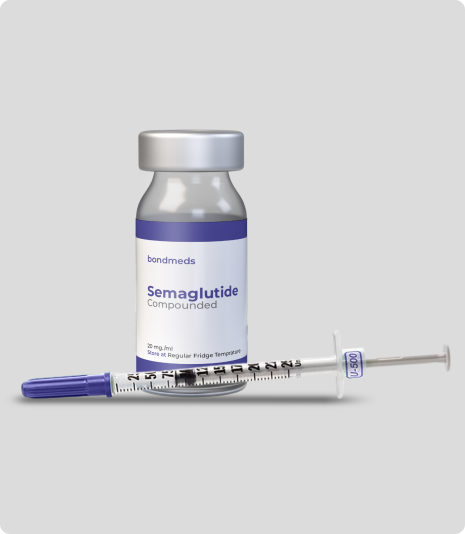Important Safety Information for Compounded Semaglutide

What is Semaglutide?
Semaglutide belongs to a class of medications known as glucagon-like peptide-1 (GLP-1) receptor agonists. It mimics the GLP-1 hormone that is released in the gastrointestinal tract in response to eating. One role of GLP-1 is to prompt the body to produce more insulin, which reduces blood glucose (sugar). GLP-1 in higher amounts also interacts with the parts of the brain that reduce appetite and signal a feeling of fullness.
There are currently three FDA-approved semaglutide products:
- Ozempic injection and Rybelsus tablets are approved to lower blood sugar levels in adults with type 2 diabetes mellitus, in addition to diet and exercise. Ozempic is also approved to reduce the risk of heart attack, stroke, or death in adults with type 2 diabetes mellitus and known heart disease.
- Wegovy injection is approved to help adults and children aged 12 years and older with obesity or some adults with excess weight (overweight), who also have weight-related medical problems, to lose weight and keep the weight off, in addition to diet and exercise.
All three medications are only available with a prescription, and there are no approved generic versions.
Can semaglutide be compounded?
When a drug is in shortage, compounders may be able to prepare a compounded version of that drug if they meet certain requirements in the Federal Food, Drug, and Cosmetic (FD&C) Act. As of May 2023, Ozempic and Wegovy are both listed on FDA’s Drug Shortages list.
Are there concerns with compounded semaglutide?
FDA has received adverse event reports after patients used compounded semaglutide. Patients should not use a compounded drug if an approved drug is available to treat a patient. Patients and health care professionals should understand that the agency does not review compounded versions of these drugs for safety, effectiveness, or quality.
Additionally, FDA has received reports that in some cases, compounders may be using salt forms of semaglutide, including semaglutide sodium and semaglutide acetate. The salt forms are different active ingredients than is used the approved drugs, which contain the base form of semaglutide. The agency is not aware of any basis for compounding using the salt forms that would meet the FD&C requirements for types of active ingredients that can be compounded.
On April 27, 2023, FDA wrote to the National Association of Boards of Pharmacy expressing the agency’s concerns with use of the salt forms in compounded products. On Oct. 10, 2023, FDA sent additional letters to the National Association of Boards of Pharmacy and the Federation of State Medical Boards expressing similar concerns. The letters also explain the conditions under which compounded semaglutide products may be permissible under the law, and note that compounded drugs are not FDA-approved or evaluated for safety and effectiveness.
What should patients know about compounded semaglutide drugs?
Patients should be aware that some products sold as ‘semaglutide’ may not contain the same active ingredient as FDA-approved semaglutide products and may be the salt formulations. Products containing these salts, such as semaglutide sodium and semaglutide acetate, have not been shown to be safe and effective.
Patients should only obtain drugs containing semaglutide with a prescription from a licensed health care provider, and only obtain medicines from state-licensed pharmacies or outsourcing facilities registered with FDA.
What should health care professionals know?
Health care professionals who are considering working with compounders to obtain semaglutide products should be aware that compounders may be using salt forms of semaglutide. FDA is not aware of any basis for compounding a drug using semaglutide salts that would meet federal requirements.
Has FDA found illegally marketed semaglutide online?
Yes. FDA vigilantly monitors the internet for fraudulent or unapproved products and has issued warning letters to stop the distribution of illegally marketed semaglutide. These drugs may be counterfeit, which means they could contain the wrong ingredients, contain too little, too much or no active ingredient at all, or contain other harmful ingredients.
Has FDA found counterfeit Ozempic in the U.S.?
FDA is aware and is investigating reports of counterfeit Ozempic being marketed in the U.S. The agency investigates any report of suspect counterfeit drugs to determine the public health risks and the appropriate regulatory response, and remains vigilant in protecting the U.S. drug supply from these threats.
How should patients protect themselves?
While we understand certain drugs are in short supply and patients are having difficulty obtaining their medication, FDA urges patients to obtain prescription drugs only from state-licensed pharmacies that are located in the U.S., where FDA and state authorities can assure the quality of drug manufacturing, packaging, distribution and labeling. FDA’s BeSafeRx campaign helps consumers learn about how to safely buy prescription medicines online. FDA recommends patients to talk to their doctor if they have questions about their medicines.
Reporting issues to FDA
FDA encourages health care professionals, patients, and compounders to report adverse events or quality problems with these or any medications to FDA’s MedWatch Adverse Event Reporting program:
- Complete and submit the report online; or
- Download and complete the form, then submit it via fax at 1-800-FDA-0178.